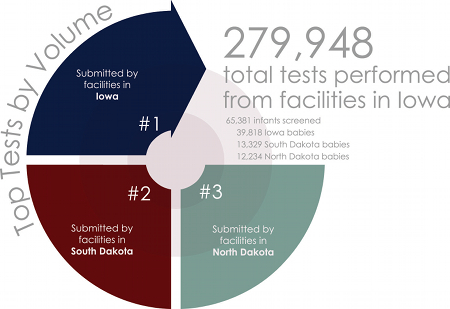Newborn Screening
Newborn Screening is a process in which infants are screened for a number of congenital and inherited conditions, which if left untreated can cause brain damage, disability and, in some cases, death. The challenge is that most infants with any of these inherited conditions show no symptoms of disease at birth. That is why newborn screening is so important. The special tests used by the newborn screening program can identify, among otherwise healthy appearing infants, an infant who may have one of more than 50 disorders.

With early diagnosis and medical treatment, complications from these serious, but uncommon, conditions can usually be prevented. The goal is to identify a baby with a disorder and initiate appropriate treatment before the condition has time to cause damaging health effects.
FY13 achievements:
- Implementation of pilot screening of all Iowa babies for Severe Combined Immunodeficiency (SCID) began this year. To accomplish this, Newborn Screening collaborated with the Hygienic Lab's Translational Research section to refine the TREC (T cell receptor excision circles) assay, which introduces a new technology into the screening program. Staff trained on performance of the new assay, installed new instrumentation, put procedures and processes in place and worked with Information Technology to incorporate management of the new screening test into our database systems.
- Newborn Screening staff conducted a preliminary evaluation of a new method for hemoglobinopathy screening called capillary electrophoresis. This method offers the potential for automating hemoglobin screening, providing more consistent result interpretation, and reducing the use of hazardous chemicals. This reduces the amount of hazardous chemical waste.
- Mike Ramirez coauthored the manuscript, "Sani-Cloth Wipe Mimics Rare Enzyme Deficiency Malonic Aciduria on Newborn Screen," published in The Journal of Pediatrics in November 2012. This was an investigation conducted by the Newborn Screening laboratory, the South Dakota Department of Health and Sanford Medical Center in Sioux Falls, in collaboration with Dr. Bailey Reindl at Sanford.
- The interest generated by the Putting Babies First video (released in May 2012)
and the press release announcing its publication, resulted in a number of media
inquiries, stories, interviews and visitors to our laboratory.
This included:
- An article entitled "Saving the lives of newborns" in the Des Moines Register.
- An article entitled "Early testing can be a lifesaver" in the Cedar Rapids Gazette. Newborn screening in Iowa is an around-the-clock operation that is conducted seven days a week, 365 days a year.
- A Big Ten Network video that aired several times during national sporting events about newborn screening and the Hygienic Lab's connection to the Putting Babies First video.